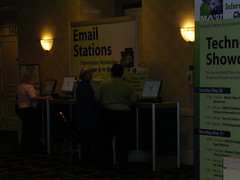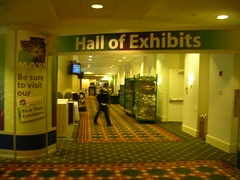Debators Wayne Peay, director, Spencer S. Eccles health Sciences Library, University of Utah Salt Lake City: Rick Forsman, planning director Denison Memorial Library, University of Colorado Health Sciences Center Denver:
Panelists:
University of Utah Salt Lake City: M.J. Tooey, executive director, Health Sciences and Human Services Library, University of Maryland Baltimore: Jane Bridges, Mercer's Clinical Campus librarian, Health Sciences Library Memorial Health University Medical Center Savannah, GA.
Debates are little hard to summarize since they are very lively and often responses and reactions often build upon each other. I will do my best to summarize.
Wayne offered the For argument:
He mentioned that we (libraries) are not in the paper business anymore. People are coming into the library but they aren't checking out materials as much as they used to. Online resources are what people are using and the rates of usage are increasing. NLM has put many things online, Open Access will succeed, thesis are being scanned and put on CD to be more easily accessible. Libraries were never about books, they were and are about information. Books are just an information source, it is time for us (librarians) to embrace electronic information as the new resource.
Rick offered the Against argument:
Rick said libraries are not one dimensional, and to say that libraries will dump all of the print in favor of all electronic resources is not functional. Since the dawn of time libraries were designed for more than just books. While faculty do not come to the library as much as they used to, students are coming to the library in droves for various reasons, to study, research, discussions, as well as no traditional library activities. The physical library structure carries many roles and messages. The library as building is the springboard to the future to create new usages for space, social interaction, and collaboration.
MJ and Jane gave their library space experiences as panelists.
MJ discussed the issue of space in academic medical libraries. Contents within the library change but the building remains the same. Usage of that space changes. MJ discussed her library is undergoing a renovation where other departments/services, not necessarily associated with libraries were going to be within the library. While it was at first disappointing that library was “giving up” space, she decided to approach it from a position of collaboration and to view those different departments/services as another way to draw more users into the library.
Jane discussed the issue of space within hospital libraries. When she first came to her library, she made a lot of changes to her library space. She tried to make the most of her limited space by removing old material, furniture, and repositioning things. Doing so enabled her to create a space for books, journals, and electronic resources. After a long time working within the limited space she has, she now might be able to expand the library because it looks like it will move to a bigger space. While this is a blessing, that does not solve all issues of space as she mention that the new potential space is very dark and will need more lighting.
The debate was interesting and fun. This topic could be very volatile but was debated with sense of fun and
congeniality.



